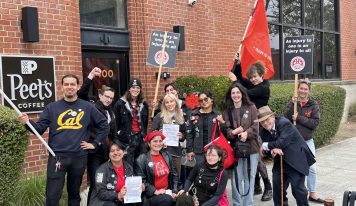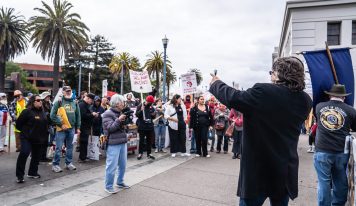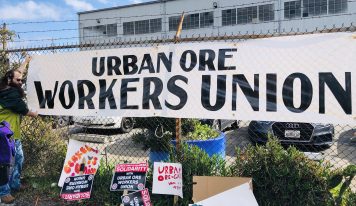Last Thursday, Alcatraz City Cruises workers elected to unionize in a 52-11 vote. Those workers, responsible for operating ferries traveling between San Francisco’s Pier 33 and Alcatraz Island, are now officially part of the Inlandboatmen’s Union of the Pacific, Marine Division of the International Longshore and Warehouse Union, (IBU – ILWU). A formal vote went through the National Labor Review Board despite immense pressure from the Hornblower Group, who for months posted anti-union literature in their break rooms and even dedicated an entire website to discourage Alcatraz City Cruises workers from voting yes in the union election.
“The results are fantastic; Alcatraz workers have spoken with a unified voice demanding better conditions,” said Evan McLaughlin, an organizer for the ILWU in Northern California. “I’m especially proud that the workers saw through the management’s union-busting tactics. They built solidarity and became stronger leading up to the election, and the results give them a strong mandate to negotiate for a great first contract.”
We recently spoke with Jack Calvin, a deckhand at Alcatraz City Cruises, to learn more about what’s next for the workers after unionization, some of the challenges they faced amid union-busting from management, and what they hope to see going forward for themselves and their colleagues.
Can you talk about what brought Alcatraz City Cruises workers to unionize?
For me, the main thing was scheduling, where you have people who have worked there for many years and still don’t work on a set schedule. They know a week or two ahead of time what days they’re working, and it’s hard to plan your life around that. Some of my colleagues who have worked there for years need to plan to take their kids to school and care for their families. They need to know what days they’ll have to work more than two weeks in advance.
Another challenge we faced in my department was safety. In my experience, it’s been up to us to keep up and train new workers on workplace safety. You’re just learning from people who have worked there longer and know how to handle different emergencies. And the company isn’t doing anything about that. They’re not completely neglecting safety training, but most of my experience has just been from learning from my colleagues.
Pay is also a big issue. My job is covered under the Service Contract Act (SCA) because Alcatraz City Cruises is a federal contractor and has to keep up with the prevailing wage for somebody else with my job in the area. And all of the other variable deckhands in the area are unionized. So, they must pay me close to the union-negotiated wage for my job. I believe this also applies to marine engineers as well. However, for my colleagues that work in food and beverage, the snack bar, and the maintenance and guest services workers, those jobs aren’t covered under the SCA, so they don’t have to be paid the same way. They make far less than we do. And it’s clear that if my department weren’t covered under this, they would pay me a lot less to do this job.
The federal mask mandate was recently lifted, and you briefly discussed safety. What has that been like for you and your colleagues?
We had a mask mandate up until recently on the [Alcatraz] island, or at least in indoor parts of the island. Because of that, they were getting rid of COVID sick pay. So now we’re at a higher risk of getting sick and catching COVID. When I had COVID, it took me out for at least two weeks. Unfortunately, I don’t have two weeks of sick time just to rest. Many people don’t have adequate sick time, especially newer employees. So it’s concerning, and we can’t afford to have two or three people out with COVID at one time.
I’m worried about what will happen now because I feel the chance of it happening will be much higher.
What is it like working as a deckhand and with other colleagues? Is there actual room for social distancing and proper ventilation?
Sometimes we have around a hundred people on the boat, so there is space to socially distance. I can also stand outside on the deck to get fresh air and ventilation. But once we’re loading and unloading the boat, passengers often may not have a choice but to stand close together, and you can’t keep that distance from them. Even if you’re standing a little bit further away, people are going to come up to you and ask questions and whatnot. And because it’s transportation, there’s no way to be completely safe from it.
There have also been times when we will have around 400 or 500 people on the boat. Because many have been traveling, some will walk right by you, and you’ll never know if you’ll potentially get sick too.
What had been the reaction and process with staff ever since management started using union-busting tactics?
Once we went public, management acknowledged it and told us that they’d let us consider this. At first, they seemed to consider voluntarily recognizing the union, which is incredibly rare and never ended up happening. So that was like a big surprise for us. They wanted us to agree to enter into three months without striking or staging walkouts, which we were more than happy to do because we weren’t planning to strike. Then, they wanted to see the union authorization cards. We refused to oblige because we asked people to sign those cards while telling them their employer would never see this.
It’s not necessarily a secret card, but this is a card that is supposed to be verified by others, not the employer. We alternatively offered to have a third party verify the number of signed cards. Their response after that was that they’d get back to us. Then, a couple of days later, they switched gears and said, “We’re not going to recognize the union voluntarily. We’d like an election,” which was expected of them from the beginning.
They hired two anti-union consultants from a company called the Redd Group, an anti-union consulting firm.
After we went public in July, these anti-union consultants had been hovering around at work or just sitting in the break room, and would sometimes try to talk to you. You’d feel a ton of pressure to talk to these people. It’d be difficult to talk to your colleagues about the unionization effort with them in the break room.
Especially in the break room on your lunch breaks, you see people who don’t work in your department and whom you don’t work with daily. The break room was a good place to meet up with these people, check in with them, ask them how they were doing, if they got their ballot in the mail, and whatnot. It was difficult to do anything like that with these consultants just over your shoulder all the time.
Our entire break room was also covered wall to wall with these anti-union posters, which was a bit humorous because it seemed desperate.
Any examples of what management or the consultants were saying to discourage you and your colleagues from unionizing?
The consultants held ‘informational sessions’ where they lied about different aspects of the union. They were trying to say things like, “Oh, it’s going to cost you $1,200 to join the union,” which is untrue. There’s no initiation fee for joining.
They were also lying about how there will be more work for us, that we’d be made to go offshore, or even that we’d have to be on a container ship for three months, which is also untrue.
Their talking points were trivial, easily disprovable, and just tactics to intimidate us from the get-go.
Now that the election is over, what’s going to happen for you all?
Now we have to negotiate a contract. The company is legally obligated to sit down with us and negotiate in good faith. So far, they haven’t indicated that they’ll refuse to do so, like what Starbucks is doing. We will also choose who will be on our negotiation team and have someone representing us from IBU. We’ll also send someone from each department to be a representative while negotiating.
I’m excited to have a contract we can point to and say, “Hey, this policy change that you’ve done goes against the contract. It is illegal for you to do this.” We won’t have to be at the mercy of the will of management and how they want to run their company. This is exciting because we get to have a say collectively in how our workplace is run.
Photo by Eddy Hernandez





